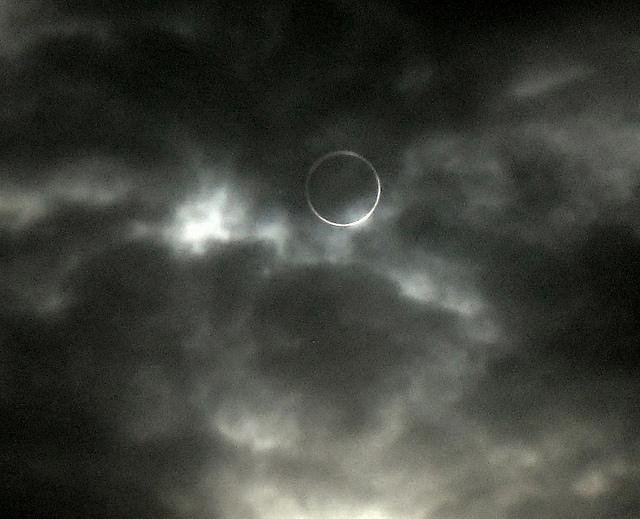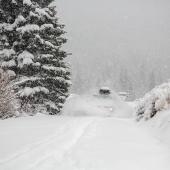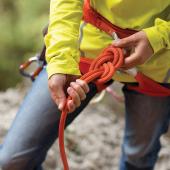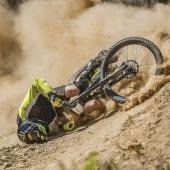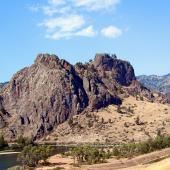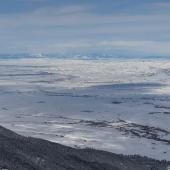Something Holy
Reflecting on the 1979 eclipse.
I didn't expect much this morning at a little past 3am as I pulled on my pants and boots, fumbling into the kitchen to boil up some coffee before leaving to snowshoe up Ross Pass. We've been immersed in "Eclipse '79" for many weeks now, and I'd heard some interesting things, but they had failed to stimulate my imagination much; and as we shuffled along in the darkness at 4:30am, I was more looking forward to a day in the sun than experiencing anything particularly unique as a result of this highly-touted solar eclipse. It was a clear, warm morning for mid-winter, and it was pleasant clumping along in the dark with only a few wispy clouds scurrying over the ridge above and disappearing over the plains to the east.
As the sun peeked over the horizon it seemed to play hide-and-seek behind the now rose-pink clouds, nervous and reluctant to appear on this big day, a day on which so many people would be watching, expecting so much. That is a burden to bear, even for the sun. But a few long rays slanted through the clouds, bringing a peach-colored glow to the cliffs of Ross Peak, and a pine grosbeak perched on top of a dead lodgepole sang a song of spring and warmth to come, helping us up the trail.
The going was good, and 8:30am brought us up to a pillow of wind-blown snow that led up the last 100 yards to the pass. A cold, damp wind flowed over the ridge, so we dug some seats in the snow amid the rocks, unpacked our gear, and settled in to await the approaching minutes of totality during which it is said that animals behave strangely and primitive peoples fall to their knees in fear, begging their gods to succor them in those strange and bewildering moments. We “more sophisticated folk” waited casually, noting the progress of the moon through welder’s glasses, chewing on pieces of bread and jerky, passing around a half-gallon jug of cheap wine. It was a party on Ross Pass, and not a bad place to be.
At about 9am the sun’s light seemed perceptibly dimmed, and as we turned to watch a strange beige light dance along the steep cliffs, a quietness settled over us. Almost as if by prearranged signal, five cream-colored mountain goats slowly appeared at the top of the pass and wandered up the snowfield toward the craggy rocks of Ross Peak. They took little notice of us, and proceeded calmly on their way, perhaps to some airy ledge high in the cliffs to view the eclipse. The six of us watched, mouths agape, as the goats passed by a hundred yards above us. Goats are not uncommon in the Bridger Range, but not often seen. But there they were, five of them strolling up the hill, disappearing around the base of a cliff after three or four minutes.
Now I could sit no longer, for I was stirred by the sight of these beautiful creatures. I walked to the top of the pass and looked off to the west, watching the dark ominous clouds that lay over the Tobacco Root Mountains 60 miles away, and the Spanish Peaks 40 miles to the south. Strange brownish-gray bands of light wavered over the Gallatin Valley, and as the queer, dull light enveloped the land, I walked, almost nervously, higher up onto the ridge and out onto a small cornice, glancing eastward to the Crazy Mountains, where a dull, orange glow lay below a gathering band of clouds hovering over the horizon.
Suddenly I felt a need to call to my friends, and I shouted, “You’ve all got to come up here now!” Indeed, the time of totality was near, and those queer bands of light swirled and whirled across the valley and over the cliffs, and we were all possessed by a sense of urgency, needing to look at so much at once. The sun, which was impossible to look at without the smoked lenses, seemed to increase in brightness, as if fighting its own eclipse. Then with a final hot, bright flash, almost as if exhausted and breathing a sigh of relief, it quietly submitted, and the moment of totality draped the land. The lights in the valley to the west shimmered in that bizarre darkness, appearing now as jewels lying on a table—rubies, emeralds, diamonds, and sapphires all scattered about, sparkling there under that foreboding sky. The snow on the mountains to the west seemed to be lit from the inside by enormous fluorescent lights, and the Spanish Peaks appeared to stand taller, stretching high and waving for our attention.
I must tell you that not one of us could stand still, or be quiet for a moment. Like children we jumped and danced, shouting and pointing, whirling about like dervishes, now to glance at the sun, now to stare trembling under the stern brown cliffs, now looking to the east to those vast lonely Crazies, and the orange sky glowing underneath the clouds like a dying fire in a darkened room. And if it were possible, possible at all, all of these visions before us seemed to grow in intensity. The Spanish Peaks would just not get down. Ross Peak above us seemed to grow higher, and perhaps sneaked a little closer. The crystals of light in the valley gleamed ever brighter. Our sense of urgency, our need to hurry, to see more and more, grew heavy on us, and we turned anxiously and fretfully about.
Then, like a match struck in the dark, a tiny corner of the sun flashed out from behind the moon, and the strange light itself seemed to grow nervous, in a hurry to leave. It began to move and flow frantically over the land. The mountains appeared to move in an effort to throw off that odd burden of dark light, and then in an instant it was done. We stood quietly, hearts pounding, wondering at this extravagant display, unable to give voice to any adequate expression of our feeling, not wanting to speak.
Then, just as suddenly as the strange light had disappeared, we exploded. “Oh, wow! Whoa… did you see those lights? Oh, wow… I don’t believe it… and the mountains… that fluorescent glow… can you believe it? The cliffs… and the clouds… that bizarre light… wow!” Oh, the lights, the jewels, the mountains, the cliffs, oh, everything. And oh, what nonsense we shouted at each other as we danced there on the mountain. And every so often someone would scream, “The goats, oh my god, the goats… we saw mountain goats! ” And that would start the cycle all over again, and we would shout the same things over and over as we tumbled our way back down the mountain, flopping along through the trees, stopping from time to time to shout again at our nearest companion some particularly vivid remembrance. “And we saw mountain goats… I can’t believe it…”
Well you can repeat a lot of nonsense on a five-mile trip down a mountain, and so we did. We spoke nonsense because nothing we could have said would have made sense of that exorbitant display. In daily conversation we are prone to describe ordinary things such as a hamburger as "awesome," "excellent," "far out," or "phenomenal." When faced with something truly awesome, excellent, far out, and phenomenal we seemed unable to respond save for our ceaseless chattering recollections of what we had seen. “And the goats, we saw mountain goats…”
“There is an ecstasy that marks the summit of life, and beyond which life cannot rise. And such is the paradox of living, this ecstasy comes when one is most alive, and it comes as a complete forgetfulness that one is alive.” So said Jack London in his famous dog story, Call of the Wild. I think we experienced that ecstasy on that winter morning now nearly 40 years ago. For a short while we experienced something so intense that there was no question in our minds of life having a purpose or a meaning. It didn’t make any difference. It was good just as it was, and that is a holy thing.

